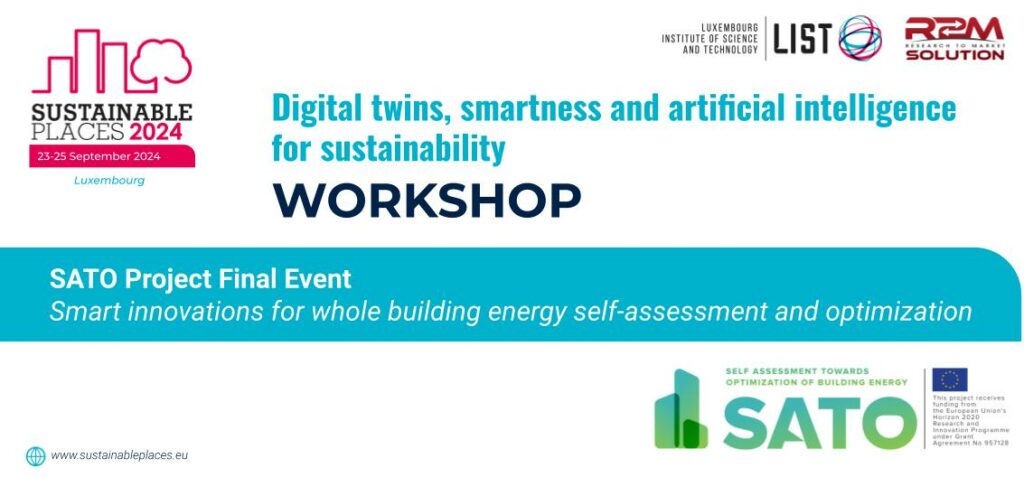Innovations for Whole Building Energy Self-Assessment
Tuesday 24 September 2024 | 09:00-12:30 | Briefing Room IT | Workshop | Hybrid

Smart innovations for whole building energy self-assessment and optimization: SATO project final event.
Reducing the gap between designed and measured energy use has become central in current efforts to increase the energy efficiency of buildings. After successfully introducing building energy performance certificates, the market is ready to assess real-life energy use, including all energy-consuming equipment in a given building. With this evolution comes the possibility of optimizing the energy performance of the whole building and its energy-consuming equipment.
The current heterogeneous building energy system context calls for the orchestration of different types of communication and control hardware/software components at the building level. A software platform can perform this orchestration to store and manage the data generated by buildings, to be used by intelligent computing systems to perform energy performance self-assessment and optimization.
SATO is an H2020-funded project to advance real-life assessment of energy performance and consumption in buildings by developing a platform, the SATO platform, for autonomous self-assessment and optimization of buildings’ energy resources.
The SATO platform consists of an IoT middleware, a self-assessment framework, a framework of optimization services, and end-user applications and interfaces. At the IoT level, SATO provides integration of buildings and interoperability across building systems for control and data collection. The Self-Assessment Framework (SAF) combines physical and artificial intelligence models for the assessment of whole building energy, occupancy, building envelope, building systems, and appliances, covering performance, fault detection and diagnosis, and resource consumption. Optimization services leverage collected data and the SAF insights to provide control and advisory energy management services for whole building, user comfort, and flexibility. Innovative assessment visualizations are displayed through mobile, web, and BIM interfaces.
SATO uses semantic models to support data and systems interoperability and to autonomously allow self-discovery, orchestration, and execution of KPIs, assessments, and services computational tasks.
The workshop will be centred on the challenge addressed by SATO and provide an overview of the project concept and key innovations. It will also include a panel discussion addressing the lessons learned and discussing known key obstacles to self-assessment and optimization of building energy.
(All listed attendees will be attending physically)
Contributing projects:
Session Chair:
Pedro M. Ferreira, University of Lisbon Faculty of Sciences – Manuel Fonseca, University of Lisbon Faculty of Sciences – Konrad Diwold, Siemens – Miracle Aniakor, FCiências.ID – Zygimantas Jasiunas, FCiências.ID – Vinicius Cogo, University of Lisbon Faculty of Sciences – Ângela Santos, SONAE – Lorenzo Pagliano, Politecnico Milano – Per Heiselberg, Aalborg University – Guilherme Graça, University of Lisbon Faculty of Sciences – Pablo Gilabert, CYPE
Workshop Chair: Pedro M. Ferreira, University of Lisbon Faculty of Sciences
